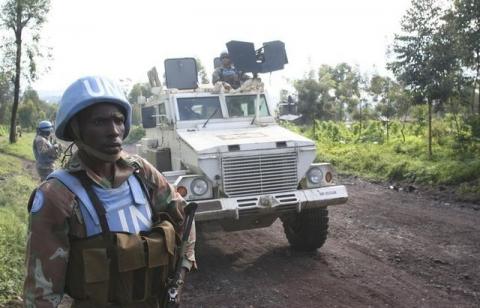Advertisement
Peacekeepers, Congo army to resume joint fight against Rwandan rebels - U.N
KINSHASA (Reuters) - Democratic Republic of Congo's army and U.N. peacekeepers agreed on Thursday to resume military cooperation against Rwandan Hutu rebels, the U.N. mission said, beefing up efforts to root out one of the region's most notorious rebel groups.
The U.N. mission pulled out of a planned joint offensive against the Democratic Forces for the Liberation of Rwanda (FDLR) a year ago after the government named two generals the U.N. suspects of widespread human rights abuses to command it.
The FDLR includes former Hutu militiamen responsible for Rwanda's 1994 genocide who then fled into eastern Congo. Its presence on Congolese soil has been cited as a reason for a series of military interventions by Rwanda.
Millions died of conflict, hunger and disease during a 1998-2003 war in eastern Congo, fuelled by Rwandan intervention, and the region remains plagued by dozens of armed groups that exploit its vast reserves of gold, diamonds and other minerals.
Thursday's agreement was signed in the capital Kinshasa by Congo Defence Minister Crispin Atama Tabe and U.N. deputy mission chief David Gressly, the latter told Reuters.
"Where we jointly agree that there is a common objective, we will work in a coordinated way using whatever assets we determine, collectively, make the most sense," Gressly said. Assistance, he said, could range from logistical aid to armed support by troops from MONUSCO, as the U.N. mission is known.
The Congo army's spokesman said he was not aware of the agreement. The government spokesman and defence minister could not be immediately reached for comment.
Gressly said the two sides agreed to establish a formal mechanism to address allegations of human rights abuses by commanders and that MONUSCO had also put in place a new internal assessment system to reduce the risk of rights violations.
After the government refused to withdraw the generals and launched unilateral operations against the FDLR last February, MONUSCO said it would accept other measures to guard against abuses. But talks about resuming cooperation stalled for months.
While the government says its ongoing military efforts have decimated the FDLR, U.N. officials and independent analysts say the offensive has been hampered by poor logistics and has failed to kill or capture key rebel leaders.
(Reporting by Aaron Ross; Editing by Joe Bavier/Mark Heinrich)



















Add new comment